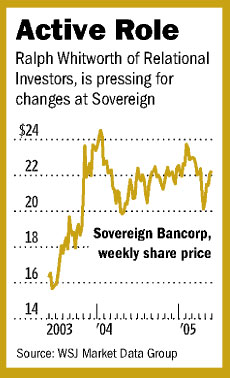Exhibit 99.17
MOVING THE MARKET | | |
May 26, 2005 | | Dow Jones WebReprint Service® |
Sovereign Is Facing a Proxy Battle
Largest Shareholder Raises Complaints
About Bank’s Bonus Plan for Directors
By Mitchell Pacelle
Sovereign Bancorp Inc. is facing a possible proxy fight by its largest shareholder, investment firm Relational Investors LLC, which has raised objections to the regional bank’s bonus plan for its directors.
Veteran shareholder activist Ralph Whitworth, a principal of the San Diego firm, said he met Monday with Sovereign’s directors to outline his complaints about corporate governance and financial performance and to propose changes. He said he will launch a proxy fight if Sovereign doesn’t reconstitute its board.

“We heard what he had to say,” said Jay Sidhu, chairman and chief executive of the Philadelphia bank. “He has his own agenda, which may or may not be consistent with the companies that he invests in.”
Sovereign said in a securities filing yesterday that it is hiring an independent compensation consultant to review pay for directors and officers. Mr. Sidhu said the consultant’s recommendations would be taken into account by the board in coming up with an “appropriate” plan.
Mr. Whitworth, whose fund manages about $5 billion, is a veteran of numerous corporate dustups, including tussles over the management of Tyco International Ltd. and Mattel Inc. He said Relational aims to invest in companies whose share prices have been depressed by mismanagement, then press for change.
Sovereign shares were up eight cents to $22.26 in 4 p.m. New York Stock Exchange composite trading. Relational, which owns 5% to 6% of the company’s shares, complains that Sovereign’s shares have trailed those of other midsize banks. Mr. Sidhu said the company’s performance has been “consistently improving,” but that the current interest-rate environment was a tough one for banks.
During his meeting with Sovereign’s board, Mr. Whitworth complained that compensation of the seven-person board was flawed by the inclusion of bonuses for directors, which are tied to whether executive bonus targets are met. Mr. Whitworth argued that the arrangement presents a conflict of interest, in that it could cause directors to be less than objective when approving goals and bonus targets for managers.
Mr. Whitworth complained that in 2004, each nonemployee director received more total pay than any director of any company in the entire banking industry. The five outside directors who have served more than one year received average compensation of $313,000 last year, Mr. Whitworth said.
“They have a pre-Enron mentality on their board, in a post-Enron environment,” Mr. Whitworth said yesterday. He said he intends to outline his concerns as early as today with the Securities and Exchange Commission.
Mr. Sidhu responded that Sovereign has “a history of taking corporate-governance issues seriously.”
Mr. Whitworth said that if Sovereign didn’t reconstitute its board, he planned to nominate competing candidates for two board seats scheduled to come up for election next year.
